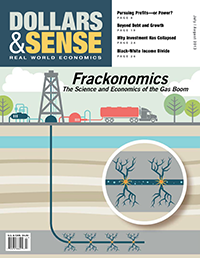Fighting Climate Change in Portlandia
Not only is failure not an option, those fighting to avert cataclysmic climate change have achieved important successes worthy of celebrating.
Do corporations seek to maximize profits? Or do they seek to maximize power? The two may be complementary--wealth begets power, power begets wealth--but they're not the same. One important difference is that profits can come from an expanding economic "pie," whereas the size of the power pie is fixed. Power is a zero-sum game: more for me means less for you. And for corporations, the pursuit of power sometimes trumps the pursuit of profits.

Take public education, for example. Greater investment in education from pre-school through college could increase the overall pie of well-being. But it would narrow the educational advantage of the corporate oligarchs and their privately schooled children--and diminish the power that comes with it. Although corporations could benefit from the bigger pie produced by a better-educated labor force, there's a tension between what's good for business and what's good for the business elite.
Similarly, the business elite today supports economic austerity instead of full-employment policies that would increase growth and profits. This may have something to do with the fact that austerity widens inequality, while full employment would narrow it (by empowering workers). If we peel away the layers of the onion, at the core again we find that those at the top of the corporate pyramid put power before profits.
As one more example, consider the politics of government regulation. Corporations routinely pass along to consumers whatever costs they incur as a result of regulation. In the auto industry, for instance, the regulations that mandated seat belts, catalytic converters, and better fuel efficiency added a few hundred dollars to car prices. They didn't cut automaker profit margins. If the costs of regulation are ultimately borne by the consumer, why do they face such stiff resistance from the corporations? The answer may have less to do with profits than with power. Corporate chieftains are touchy about their "management prerogatives." They simply don't like other folks telling them what to do.
In a famous 1971 memorandum to the U.S. Chamber of Commerce, future Supreme Court Justice Lewis Powell wrote, "The day is long past when the chief executive office of a major corporation discharges his responsibility by maintaining a satisfactory growth of profits." To counter what he described as an attack on the American free-enterprise system by labor unions, students, and consumer advocates, Powell urged CEOs to act on "the lesson that political power is necessary; that power must be assiduously cultivated; and that when necessary, it must be used aggressively and with determination." He was preaching to a receptive choir.
The idea that firms single-mindedly maximize profits is an axiom of faith of neoclassical Econ 101, but alternative theories have a long history in the broader profession. Thorstein Veblen, John Maynard Keynes, and Fred Hirsch all saw an individual's position relative to others as a key motivation in economic behavior. Today a sound-bite version of this idea is encountered on bumper stickers: "He Who Dies with the Most Toys Wins."
In his 1972 presidential address to the American Economics Association, titled "Power and the Useful Economist," John Kenneth Galbraith juxtaposed the role of power in the real-world economy to its neglect in orthodox economics: "In eliding power--in making economics a nonpolitical subject--neoclassical theory... destroys its relation with the real world."
On the free-marketeer side of the ideological spectrum, the pursuit of power is depicted as a pathology distinctive to the State. "Chicago school" economist William Niskanen theorized that public-sector bureaucrats seek to maximize the size of their budgets, taking this as a proxy for "salary, perquisites of the office, public reputation, power, patronage, ease of managing the bureau, and ease of making changes." He called this "the peculiar economics of bureaucracy."
But the pursuit of power isn't unique to government bureaucracies. It's commonplace in corporate bureaucracies, too. In his presidential address, Galbraith made the connection: "Between public and private bureaucracies-- between GM and the Department of Transportation, between General Dynamics and the Pentagon--there is a deeply symbiotic relationship."
Recognizing the real-world pursuit of power not only helps us understand behavior that otherwise may seem peculiar. It also redirects our attention from the dichotomy between the market and the state toward a more fundamental one: the divide between oligarchy and democracy.